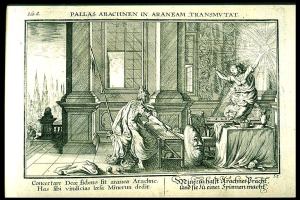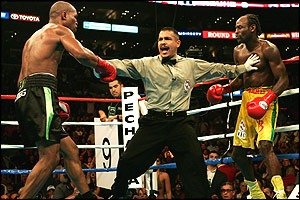All posts for the month December, 2008
Reverend Alicia Obeys, Trusts, and Gives Praise
Posted by CMStewart on December 31, 2008
https://losthunderlads.com/2008/12/31/reverend-alicia-obeys-trusts-and-gives-praise/
Spinach and rice omelette
If you have traditional ideas about breakfast food but you need to start the day with iron, you might try this quick and tasty meal.
Take six ounces of canned spinach and squeeze it dry. Mix it with one cup of cooked rice.
Break three large eggs into a cup. Add milk and stir until the mixture is even.
Drop a pat of butter into a frying pan. Heat the frying pan until the butter starts to melt. Then pour the milk and eggs mixture in. Stir the butter through the mixture a few times, then add the spinach and rice, one forkful at a time.
Click here for more omelette recipes.
Posted by acilius on December 30, 2008
https://losthunderlads.com/2008/12/30/spinach-and-rice-omelette/
Words with nonpejorative technical uses and nontechnical pejorative uses
There are some words which have both a technical meaning in some field of study and a pejorative meaning that is more widely known. A notorious example is “Negro,” which now tends to be used as a slur in colloquial English but which physical anthropologists still use because none of the alternatives captures the meaning they need to express. Another example would be “cult.” In the study of religion, “cult” is the rites and practices of a particular group. A scholar of religion could refer to any faith group as having a “cult” in this sense and be confident that no one would take offense. Of course, there’s also the pejorative sense of “cult,” a sect considered false or extreme.
The word “essentialism” is at the head of a whole category of examples. Some philosophers hold that each entity in the universe has a number of qualities, that some of these qualities are more important to the entity than others, and that human reason is capable of distinguishing the more important qualities from the less important ones. This view is called essentialism. Essentialism in this sense is a perfectly respectable philosophical position, and from the days of Plato and Aristotle down to the present it has consistently commanded the allegiance of many eminent thinkers. Few would claim that these thinkers have proven beyond doubt that essentialism is true, but it is certainly plausible. Indeed, while virtually anyone who has read a little Plato can put up a reasonable case for essentialism, it takes a considerable philosophical background to make a sensible case against it.
The same word is used in a different, though related sense. Many postmodernist thinkers use the word “essentialist” as a sort of curse word. In their parlance, “essentialist” often seems to mean something like “stereotyped” or “inattentive to details.” The “essentialism” they invoke seems to be an image of a person who slaps hasty definitions on categories, assigns other people to those categories, and proceeds to interact with the people as if the only qualities they had were those that defined the categories to which they were assigned. So, someone who decides to equate “ukuleleist” with “weirdo who doesn’t want to grow up” might meet someone who plays the ukulele and insist on always and only treating that person as a weirdo who doesn’t want to grow up. Sociologists among you will be reminded of the role of labeling in social relationships, but I think you can see that this use of the word “essentialism” is a gross caricature of the philosophical position I sketched above.
The names of many philosophical schools and positions have been subjected to this kind of semantic shift. So the ancient Epicureans argued that pleasure was a positive good; their opponents transformed their name into a synonym for “gourmand.” The Stoics argued that a right understanding of nature’s laws would free the mind from fear; now we say “stoic” when we mean “unemotional.”
Posted by acilius on December 29, 2008
https://losthunderlads.com/2008/12/29/words-with-nonpejorative-technical-uses-and-nontechnical-pejorative-uses/
Hot Chocolate Drinks

newsimg.bbc.co.uk
HOT COCOA/HOT COCOA COCKTAIL
Hot Cocoa (recipe by Alton Brown):
2 cups powdered sugar
1 cup Dutch-process cocoa
2 1/2 cups powdered milk
1 teaspoon salt
2 teaspoons cornstarch
1 pinch cayenne pepper
milk or water
1. Combine all dry ingredients in a bowl and incorporate evenly.
2. Heat milk or water.
3. Fill mug half full with mixture and pour in hot milk or water and stir.
4. Store remaining mixture in an airtight container.
Hot Cocoa Cocktail:
Pour one shot of Peppermint Schnapps and two shots of Kahlúa into a large mug, then fill to the brim with prepared Hot Cocoa drink (see above).
HOT COCOA CLOUD
2 cups milk
½ cup half and half
3 ounces dark chocolate pieces (at least 85% cocoa)
2 tablespoons maple syrup
1 pinch cayenne pepper
1 teaspoon vanilla extract
2 tablespoons dark rum
1 cinnamon stick
Put first 5 ingredients in a pot and gently heat while stirring with cinnamon stick. When the chocolate is melted, turn off heat and add vanilla and rum. Stir with cinnamon stick and serve.
Posted by CMStewart on December 28, 2008
https://losthunderlads.com/2008/12/28/hot-chocolate-drinks/
Boxing Day
Referee Micky Vann ends a fight between Amir Khan and Martin Kristjansen, 5 April 2008:
Referee Ian St. John steps in between Kevin Mitchell and Carl Johanneson, 9 March 2008:
Referee Raul Caiz Jr separates Bernard Hopkins and Howard Eastman, 19 Feb 2005:
Posted by acilius on December 26, 2008
https://losthunderlads.com/2008/12/26/boxing-day/
Merry Christmas!
Seasons greetings from 1948:
Posted by acilius on December 25, 2008
https://losthunderlads.com/2008/12/25/merry-christmas/
Victoria Vox wants to spend Christmas with you
Posted by acilius on December 25, 2008
https://losthunderlads.com/2008/12/25/victoria-vox-wants-to-spend-christmas-with-you/
Some nativity scenes
Posted by acilius on December 25, 2008
https://losthunderlads.com/2008/12/25/some-nativity-scenes/
Bernd Dombrowski Wishes You a Merry Christmas from the Bottom of His Heart
Posted by CMStewart on December 25, 2008
https://losthunderlads.com/2008/12/25/bernd-dombrowski-wishes-you-a-merry-christmas-from-the-bottom-of-his-heart/









